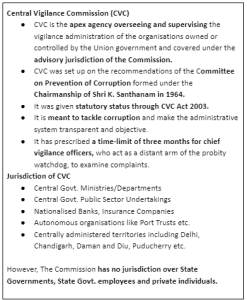Context: According to the Central Vigilance Commission (CVC) latest annual report, it received a total of 1,15,203 corruption complaints against all category employees of the central government in 2022.

More on the News:
- Out of the total complaints, 85,437 have been disposed of and 29,766 are still pending.
- 22,034 complaints have been pending for more than three months.
- Ministry-Wise: CVC has received the highest number of corruption complaints against employees of the Union home ministry, followed by those working for the railways and in banks..
- Government of National Capital Territory of Delhi received 7,370 complaints of corruption.
Corruption and its Menance
- UN’s Global Programme against Corruption (GAPAC) defines corruption as ‘the abuses of power for private gain and includes thereby both the public & private sector and private Individual’.
- There are various kinds of corruption like conflict of interest, embezzlement, fraud, bribery, political corruption, nepotism and extortion.
India and Corruption
- In India, corruption is omnipresent in almost every government sector, from sanctioning driving license to framing of policy of NREGA.
- It is evident from the fact that as per Transparency International, India is ranked 85 amongst 180 countries in the corruption index, which is pitiful.
| The Corruption Perceptions Index (CPI) is an index which ranks countries “by their perceived levels of public sector corruption, as determined by expert assessments and opinion surveys. It is released by Transparency International. |
- According to a survey by global civil society Transparency International, India has the highest rate of bribery and use of personal links to access public services such as healthcare and education in Asia.
Some of the reasons for corruption in India are:
- Legacy issues: The colonial rule and the feudal system left behind a culture of patronage, nepotism, and hierarchy that fostered corruption.
- Inefficient governance induces corrupt practices: The public administration and the political system are often opaque and unresponsive to the citizens’ demands and grievances.
- There is a lack of effective mechanisms to monitor and punish corrupt officials.
| Article 311
It states that no civil servant can be dismissed from his office, removed from his office or his rank can be reduced, except by a person in authority of the same rank as the officer that appointed him. |
- Weak institutions and laws: The judiciary, the police, the media, and the civil society are often ineffective or compromised in their role of checking and balancing the power of the executive and the legislature.
- Failure of the judiciary to hold corrupt officials, particularly politicians, accountable. Excessive protection afforded to civil officials under Articles 311 of the constitution and the requirement to obtain government approval before bringing civil servants to justice.
- Weak enforcement mechanisms: The National Crime Records Bureau (NCRB) data for 2019 shows that the conviction rate for cases registered under the Prevention of Corruption Act (PCA) was only 34.3%.
- High demand and low supply of public goods and services: The population growth, urbanization, and economic development have increased the demand for public goods and services such as education, health, infrastructure, etc.
- Lack of supply of these goods and services is often inadequate, inefficient, or unequal, creating a gap that can be exploited by corrupt intermediaries or officials.
- Complex bureaucratic procedures: According to the World Bank’s Ease of Doing Business Report 2020, India ranks 63rd out of 190 countries in terms of “dealing with construction permits,” indicating that bureaucratic procedures can be time-consuming and cumbersome.
- The Economic Survey of India 2020-21 acknowledges that regulatory complexity can create opportunities for corruption and calls for simplifying regulations.
- Limited access to information: The Right to Information (RTI) Act, which is intended to promote transparency and accountability, has faced challenges in implementation, including delays and lack of response to RTI requests.
- Transparency International found that only 37% of Indians surveyed believed that ordinary people can make a difference in the fight against corruption.
- Cultural acceptance of corruption in some areas: According to Transparency International, 32% of Indians believed that it is acceptable for a business to pay a bribe to win contracts.
- The National Family Health Survey (NFHS) 2019-20 found that in some states, such as Bihar and Jharkhand, a significant proportion of households reported paying bribes for public services such as healthcare.
Impacts of corruption in India are:
- Economic losses: Corruption reduces the efficiency and effectiveness of public spending and investment, leading to wastage of resources, misallocation of funds, inflation, lower growth, and higher poverty.
- Corruption also discourages private investment and innovation, erodes tax revenues, distorts markets, and increases the cost of doing business.
- Social costs: Corruption undermines the quality and accessibility of public goods and services, especially for the poor and marginalized groups.
- Corruption affects the delivery of basic rights such as education, health, water, sanitation, etc., leading to lower human development outcomes.
- Corruption also erodes the trust and confidence of the people in the government and the institutions, leading to social unrest, violence, and extremism
- Political consequences: Corruption weakens the legitimacy and credibility of the democratic system and the rule of law.
- Corruption affects the electoral process, the representation of the people, and the accountability of the leaders.
- Corruption enables the capture of the state by powerful elites or interest groups who influence policies and decisions for their own benefit.
- On marginalized communities in India: Corruption exacerbates poverty, inequality, and social exclusion, hindering their access to basic services such as healthcare, education, and sanitation.
- Corruption undermines the effectiveness of government schemes and programs designed to benefit the marginalized communities.
Steps taken to Prevent Corruption in India
- Prevention of Corruption Act, 1988: It defines corruption as the act of offering or accepting bribes, misusing public resources, or using one’s position of power for personal gain.
- The act establishes various penalties and punishments for those found guilty of corruption, including fines and imprisonment.
- Right to Information Act, 2005: It enables the citizens of India to inquire and seek information from a Public Authority, thereby making the Government and its functionaries liable for its affairs and the institution is required by law to reply immediately or under thirty days of filing of the application.
- RTI gives citizens the legal right to access information from public authorities, which promotes transparency and accountability in government operations.
- Institution of Lokpal: The Lokpal is an anti-corruption ombudsman institution in India.
- It was established through the Lokpal and Lokayuktas Act, 2013, with the aim of investigating and prosecuting cases of corruption among public officials, including the Prime Minister, Ministers, and Members of Parliament.
- The Lokpal is an independent body that is responsible for receiving complaints from the public, conducting investigations, and prosecuting those found guilty of corruption.
- National Anti-Corruption Strategy (NACS), launched in 2011, aims to build public awareness about corruption and promote a culture of integrity.
- National e-Governance Plan (NeGP), launched in 2006, aims to transform governance by leveraging technology to improve transparency, efficiency, and citizen participation.
- Simplifying regulatory procedures:
- Disbursement of welfare benefits directly to the citizens under various schemes of the Government in a transparent manner through the Direct Benefit Transfer initiative.
- Implementation of E-tendering in public procurements.
- Introduction of e-Governance and simplification of procedure and systems.
- Introduction of Government procurement through the Government e- Marketplace (GeM).
Recommendations to curb corruption in India are:
- Strengthening legal framework and institutions:
- The judiciary, the police, the media, and the civil society should be empowered and supported to perform their roles effectively and independently.
- The laws and regulations should be simplified, updated, harmonized, and enforced strictly.
- The anti-corruption agencies should be given more autonomy, authority, resources, and accountability.
- Enhancing transparency and accountability:
- Implement robust systems for financial transparency, including e-governance and digital platforms.
- Encourage public disclosure of assets and liabilities of public officials.
- Promote transparency in public procurement processes.
- Promoting citizen participation:
- Facilitate citizen engagement in decision-making processes through mechanisms like public consultations and participatory budgeting.
- Encourage the use of social audits to monitor the implementation of public programs.
- Foster a culture of whistleblowing and protect whistleblowers from retaliation.
- Improving public service delivery:
- Streamline bureaucratic procedures and reduce discretion to minimize opportunities for corruption.
- Implement merit-based recruitment, performance evaluation, and promotion systems.
- Enhance access to quality public services, particularly in sectors prone to corruption.
- Strengthening ethics and integrity:
- Promote ethical leadership and integrity in public and private sectors through training programs and awareness campaigns.
- Establish codes of conduct and ethical standards for public officials and professionals.
- Encourage the adoption of corporate governance practices to prevent corruption in the business sector.
- Enhancing international cooperation:
- Collaborate with international organizations and other countries to combat cross-border corruption and money laundering.
- Ratify and implement international conventions against corruption, such as the United Nations Convention against Corruption (UNCAC).
News Source: India Today
To get PDF version, Please click on "Print PDF" button.

